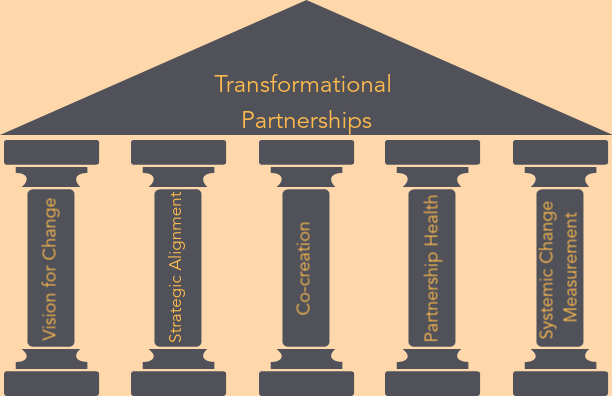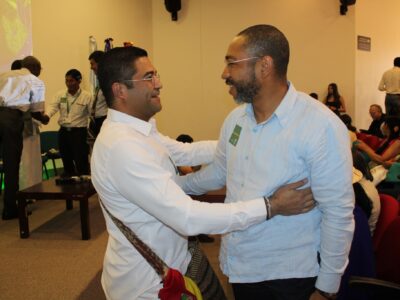
ACDI/VOCA recently hosted a technical exchange focused on transformational partnerships. While the purpose of this exchange was to share examples in our work of tools and strategies that allowed us to support inclusive, competitive, and resilient market systems, we also aimed to build a common understanding of what makes a partnership transformational.
What we found is that these types of partnerships address systemic problems. Because of their systemic focus, the factors that determine their success mirror the four elements of ACDI/VOCA’s inclusive market systems approach: (1) analyze, (2) strategize, (3) collaborate, and (4) learn and adapt. So, what are the factors of success that allow us to build deeper engagement with our partners?

1. Have a Vision for Change
Transformational partnerships articulate a clear understanding of a market system and what conditions, policies, or relationships will be influenced to improve the overall performance of the system. These changes result from four pathways that transform a market system, as illustrated below. Consider taking a portfolio approach to designing partnerships around these four types of systems changes:
- Introducing something new or different: The development, uptake, and mass adoption of new products, innovations, behaviors, or practices
- Changing network patterns: Coordination and collaboration to create synergies and transform network structures to increase access or connectivity to markets
- Collaborating on reforms: Dialogue and collective action to promote reforms and mobilize stakeholders to overcome status quo constituents
- Supporting learning and self-reliance: Strengthened capabilities of influential partners to shape the broader market system. Partners we work with are satisfied with the change we are facilitating and continue to invest in these changes.
2. Align the Value Proposition
What is something that both parties want to achieve that they could not do by themselves? Strategic alignment allows both parties to understand where to place their efforts towards creating a pathway for transformational change. This includes agreement on a joint vision, goals, and objectives of both partners.
3. Co-create and collaborate with Partners Across a Range of Approaches
Co-creation supports ownership, innovation, and mutual understanding among partners. During co-creation, it is critical to demonstrate additionality and value add. We can do this by acting as an innovator, facilitator, coach, convenor, or investment catalyst for partners. The range of approaches may differ depending on the market context and will frequently differ depending on the private sector’s needs and incentives to influence the market.
4. Establish a Relationship Performance Tracking System
Recent research led by USAID found that partners reporting healthy relationships had fewer challenges, more time to focus on results, and stronger performances. ACDI/VOCA’s Partnership Health Tool provides a performance tracking system. This system allows us to prioritize which behaviors and practices most contribute to partnership health and to proactively monitor the strength of the relationship and course-correct as needed.
5. Measure Changes in Market Systems
The last building block of a successful transformational partnership is measuring how market systems are becoming more competitive, inclusive, and resilient. How we attribute those changes to our partnerships depends on these three criteria:
- Scale: Does the partnership extend beyond a single private sector company or consumer to impact the entire supply chain?
- Depth: Does the partnershipchange the structure of the system, in terms of its diversity, connectivity, or the presence of organizations?
- Sustainability: Does the partnership enable the changes to become sustainable?
ACDI/VOCA’s Market Systems Diagnostic helps analyze changes in market structures and enterprise behaviors to understand how and whether the market system as a whole is changing to become more inclusive, competitive, and resilient. We also use a combination of other methods such as outcome harvesting and network analysis.
The concept of transformation is still relatively new, and we are constantly learning and innovating. For more guidance see our newly developed PSE Toolkit. In the coming months, our experts will continue this conversation and dive deeper into how transformational change happens.
Comments







